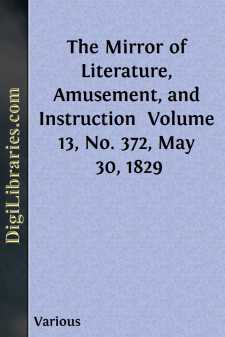Categories
- Antiques & Collectibles 13
- Architecture 36
- Art 48
- Bibles 22
- Biography & Autobiography 813
- Body, Mind & Spirit 142
- Business & Economics 28
- Children's Books 15
- Children's Fiction 12
- Computers 4
- Cooking 94
- Crafts & Hobbies 4
- Drama 346
- Education 46
- Family & Relationships 57
- Fiction 11828
- Games 19
- Gardening 17
- Health & Fitness 34
- History 1377
- House & Home 1
- Humor 147
- Juvenile Fiction 1873
- Juvenile Nonfiction 202
- Language Arts & Disciplines 88
- Law 16
- Literary Collections 686
- Literary Criticism 179
- Mathematics 13
- Medical 41
- Music 40
- Nature 179
- Non-Classifiable 1768
- Performing Arts 7
- Periodicals 1453
- Philosophy 64
- Photography 2
- Poetry 896
- Political Science 203
- Psychology 42
- Reference 154
- Religion 513
- Science 126
- Self-Help 84
- Social Science 81
- Sports & Recreation 34
- Study Aids 3
- Technology & Engineering 59
- Transportation 23
- Travel 463
- True Crime 29
The Atlantic Monthly, Volume 10, No. 58, August, 1862
by: Various
Categories:
Description:
Excerpt
THE NEW GYMNASTICS.
Physical culture is on the top of the wave. But the movement is as yet in the talk stage. Millions praise the gymnasium; hundreds seek its blessings. Similar incongruities make up the story of human life. But in this case inconsistency is consistent.
Evidences of physical deterioration crowd upon us. Fathers and mothers regard their children with painful solicitude. Not even parental partiality can close the eye to decaying teeth, distorted forms, pallid faces, and the unseemly gait. The husband would gladly give his fortune to purchase roses for the cheeks of the loved one, while thousands dare not venture upon marriage, for they see in it only protracted invalidism. Brothers look into the languishing eyes of sisters with sad forebodings, and sisters tenderly watch for the return of brothers, once the strength and hope of the fatherless group, now waiting for death. The evil is immense. What can be done? Few questions have been repeated with such intense anxiety.
My object is to submit, for the consideration of the readers of the "Atlantic," a new system of physical training, adapted to both sexes, and to persons of all ages and degrees of strength. I have an ardent faith that in it many will find an answer to the important question.
The common remark, that parents are too much absorbed in the accomplishments of their daughters to give any attention to their health, is absurd. Mothers know that the happiness of their girls, as well as the character of their settlement in life, turns more upon health and exuberance of spirits than upon French and music. To suppose, that, while thousands are freely given for accomplishments, hundreds would be refused for bodily health and bloom, is to doubt the parents' sanity. If the father were fully satisfied that Miss Mary could exchange her stooping form, pale face, and lassitude for erectness, freshness, and elasticity, does anybody suppose he would hesitate? Fathers give their daughters Italian and drawing, not because they regard these as the best of the good things of life, but because they form a part of the established course of education. Only let the means for a complete physical development be organized, and announced as an integral part of our system of education, and parents would be filled with grateful satisfaction. The people are ready and waiting. No want is so universal, none so deeply felt. But how shall symmetry and vigor be reached? What are the means? Where is the school? During the heat of the summer our city-girls go into the country, perhaps to the mountains: this is good. When in town, they skate or walk or visit the riding-school: all good. But still they are stooping and weak. The father, conscious that their bodies, like their minds, are susceptible of indefinite development, in his anxiety takes them to the gymnasium. They find a large room furnished with bars, ladders, and swings. They witness the wonderful performances of accomplished gymnasts and acrobates, admire the brilliant feats; but the girls see no opportunity for themselves....






















